- What is Node.js
- Market of Node.js
- Top 10 Types of Node.js framework: How to use them in the best way?
- Why we should use Node.js for App Development
- 20 Key Features of Node.js for Optimal App Development
- Top 10 Companies using Node.js
- How much time does Node.js mobile app development take?
- Key consideration for developing a mobile app using Node.js
- Conclusion
- FAQs

Node.js mobile app development uses JavaScript as the primary programming language. This decreases development time and thus saves companies a lot of money. Node.js also allows developers to share data easily between the server side and the client side.
It is one of the most popular platforms for building fast and scalable mobile and web applications. Node is an open-source server environment built on Google Chrome’s JavaScript runtime. Many big-name companies, including Walmart, PayPal, Netflix, and Uber, use Node.js.
- What is Node.js
- Market of Node.js
- Top 10 Types of Node.js framework: How to use them in the best way?
- Why we should use Node.js for App Development
- 20 Key Features of Node.js for Optimal App Development
- Top 10 Companies using Node.js
- How much time does Node.js mobile app development take?
- Key consideration for developing a mobile app using Node.js
- Conclusion
- FAQs
What is Node.js
Node.js is an open-source, server-side, cross-platform JavaScript runtime environment that allows developers to build and execute server-side applications. It uses the V8 JavaScript engine, developed by Google for use in their Chrome web browser, to run JavaScript code outside of the browser. This enables developers to use JavaScript not only for client-side programming in web browsers but also for server-side development.
The Node.js project released the new version, Node.js v21.4.0, on December 5, 2023.
There are various Node.js frameworks that help developers create the perfect mobile app for their users.
| Name of Framework | Node.js |
| Launched In | 2009 |
| Written By | Ryan Dahl |
| Written In | C, C++, JavaScript |
| Repository | github.com/nodejs/node |
| Popular Apps that Use Node.js | Uber, Netflix, Discord, Airbnb |
1. The Architecture of Node.js
Node.js stands on a foundation of fundamental architectural principles that elevate it as a robust environment for server-side JavaScript. Here are several key architectural concepts shaping its core:
1.1. Singular Threaded Event Loop Structure
Node.js functions within a single-threaded event loop structure, empowering it to adeptly manage numerous concurrent clients.
1.2. Asynchronous Model Operation
Node.js employs an asynchronous model, ensuring seamless operation without hindering other tasks.
1.3. Event-Driven Operational Framework
Node.js operates on an event-driven architecture, where each task responds to triggered events through a callback mechanism.
1.4. Non-Blocking I/O Mechanism
Node.js adopts a non-blocking input/output model, proficiently managing file operations, data transactions, and interactions with the database without causing blockages.
1.5. JavaScript Runtime Foundation
Node.js serves as a JavaScript runtime founded on Chrome’s V8 JavaScript engine, solidifying its position as a versatile and powerful development platform.
2. The Key Components and Modules of node.js
Node.js is structured around essential elements and modules that establish it as a potent platform for server-side JavaScript. Here are the key components:
2.1. Foundational Modules
Node.js incorporates predefined modules, eliminating the need for additional installations. Notable modules encompass:
- ‘http’ and ‘https’: Facilitating Node.js as an HTTP or HTTPS server.
- ‘fs’: Managing the file system.
- ‘path’: Handling file paths.
- ‘os’: Providing operating system information.
- ‘events’: Managing events.
- ‘util’: Accessing utility functions.
- ‘crypto’: Handling OpenSSL cryptographic functions.
2.2 Custom Modules
Developers can craft their modules and integrate them into applications. The ‘exports’ keyword ensures accessibility beyond the module file.
2.3. External Modules
Node.js boasts a diverse repository of third-party modules accessible through the Node Package Manager (NPM).
2.4. Non-Blocking Operational Model
Node.js adopts an asynchronous model, prioritizing smooth operation without impeding concurrent tasks.
2.5. Event-Driven Framework
Node.js executes event-driven operations, where events trigger tasks with the deployment of callback functions.
2.6. Singular-Threaded Event Loop Structure
Witness Node.js’s singular-threaded event loop structure in action, proficiently managing numerous client requests concurrently, ensuring a streamlined and responsive user experience.
Market of Node.js
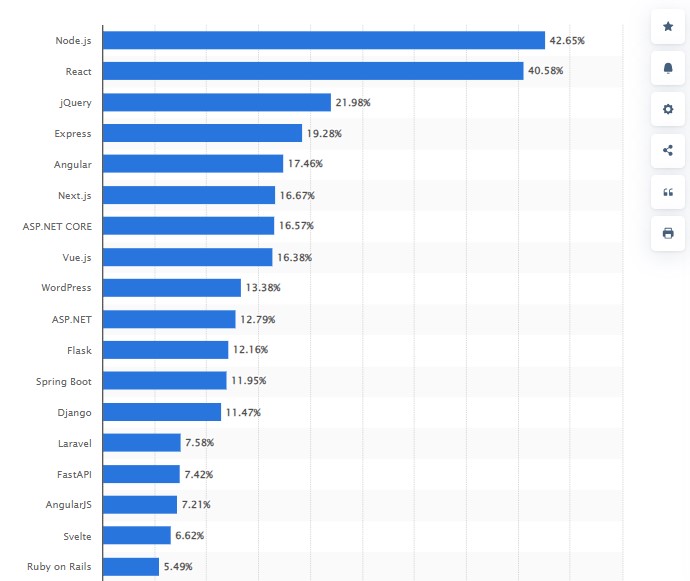
Source – Statista
In 2023, Node.js surpassed React.js to emerge as the predominant web framework globally among software developers. The survey data reveals that approximately 42.7% of participants indicated their utilization of Node.js, surpassing the 40.6% who reported using React.js. This shift signifies the growing prominence of Node.js in the development landscape, highlighting its increasing adoption by developers worldwide.
Node.js development services and solutions have experienced a surge in popularity, accompanied by misconceptions and rumors. As a backend developer or business owner, you’ve likely encountered the hype around Node.js. Far from mere noise, this buzz signifies the emergence of a robust and advanced runtime environment. Since its 2009 inception, developers have harnessed Node.js capabilities with continuous updates and the latest version, Node JS 21, piquing curiosity among web developers.
Below is a Node.js Release Cycle that you might find interesting:
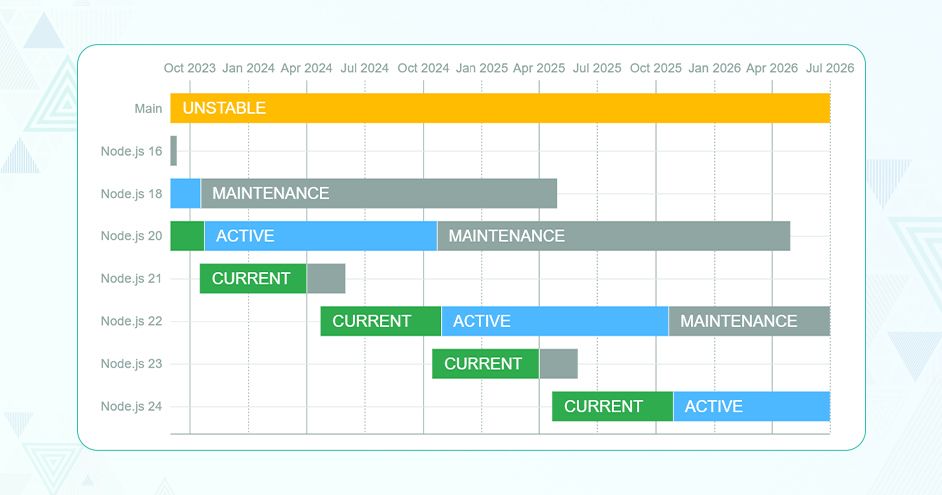
Source – Radixweb
As per the report, in the year 2023, NodeJS was adopted by more than 275,289 companies globally as a primary tool for programming languages. NodeJS faces competition in the Programming Languages category, with HTML leading at 60.24%, followed by PHP with 33.95%, and ECMAScript with a 1.34% market share.
In terms of company size, the majority of NodeJS users in the programming-language category consist of 0-9 employees (108,379 companies), 20-49 employees (55,815 companies), and 10-19 employees (36,551 companies).
Examining NodeJS’s geographical reach, the United States takes the lead with 119,833 users (57.11%), followed by the United Kingdom with 17,500 users (8.34%) and India with 16,220 users (7.73%).
NodeJS finds prominent usage in Software Development (4,476 companies), Web Development (3,940 companies), and Marketing (3,623 companies) for Programming Languages.
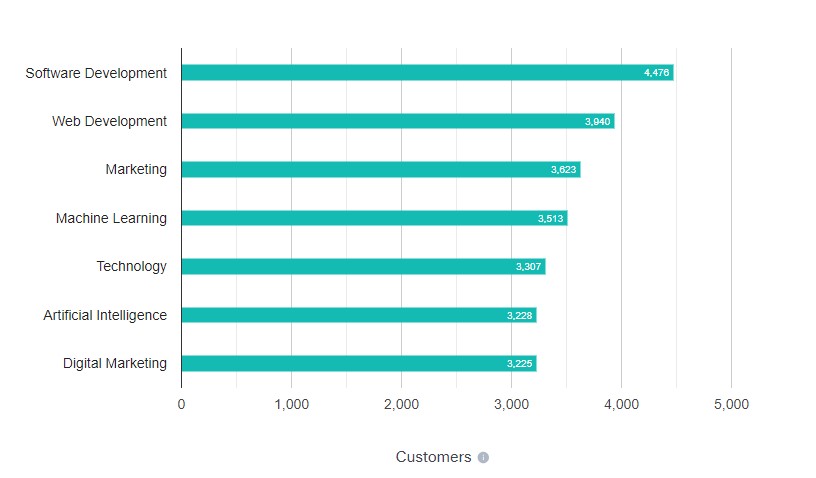
Source – 6sense.com
Top 10 Types of Node.js framework: How to use them in the best way?
Software engineers build frameworks, optimize, and test them over time. This refines the frameworks to an unbelievable degree of perfection.
Frameworks allow you to focus on the high-level functionality of applications that you want to create. The framework itself handles the low-level functionality aspect.
Here is a list of some of the most popular Node.js frameworks:
1. Ionic
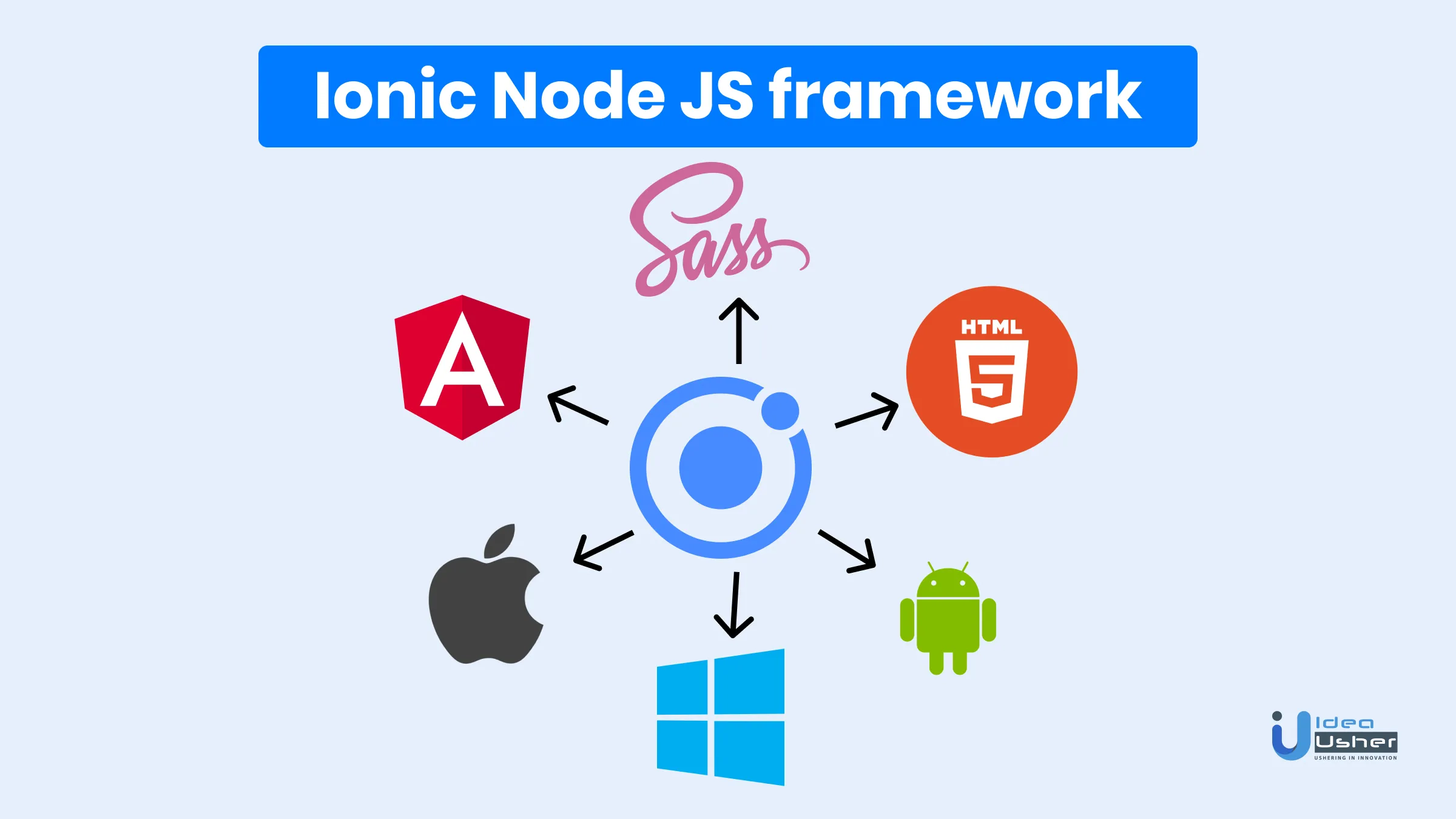
Ionic is one of the Node.js cross-platform app development frameworks. It focuses on bettering the user experience of the developing application. The developer must use HTML, CSS, and JavaScript to make the apps on the Ionic framework.
Developers can also use Saas and Angular JS in this framework. Developers can use this framework to incorporate UI components into their applications. UI components are buttons, navbars, header/footers, etc. The Ionic framework can be used for both Android and iOS making it a versatile framework.
2. Xamarin
Xamarin uses C# and .NET to create a mobile application. It is a free, open-source application development platform for building Android, iOS apps with Node.js.
Xamarin belongs to the .NET dynasty, with over 60k community members who have refined the framework over time. Xamarin is generally used when it comes to multi-platform app development. It allows the developers to write a single snippet of code and use it for multiple platforms.
Popular apps made using Xamarin:
- Alaska airlines customer applications,
- CA Mobile for mobile banking, and
- Novarum DX, a medical app
3. Retrofit
Retrofit is a Node.js framework that is a type-safe HTTP client for Android and Java – developed by Square.
This framework is often used when it comes to Java and Android. Retrofit makes it simple to retrieve and upload JSON via a REST-based web service. In other words, it’s just an open-source java library built by Square. However, Retrofit is incapable of iOS development.
4. React Native
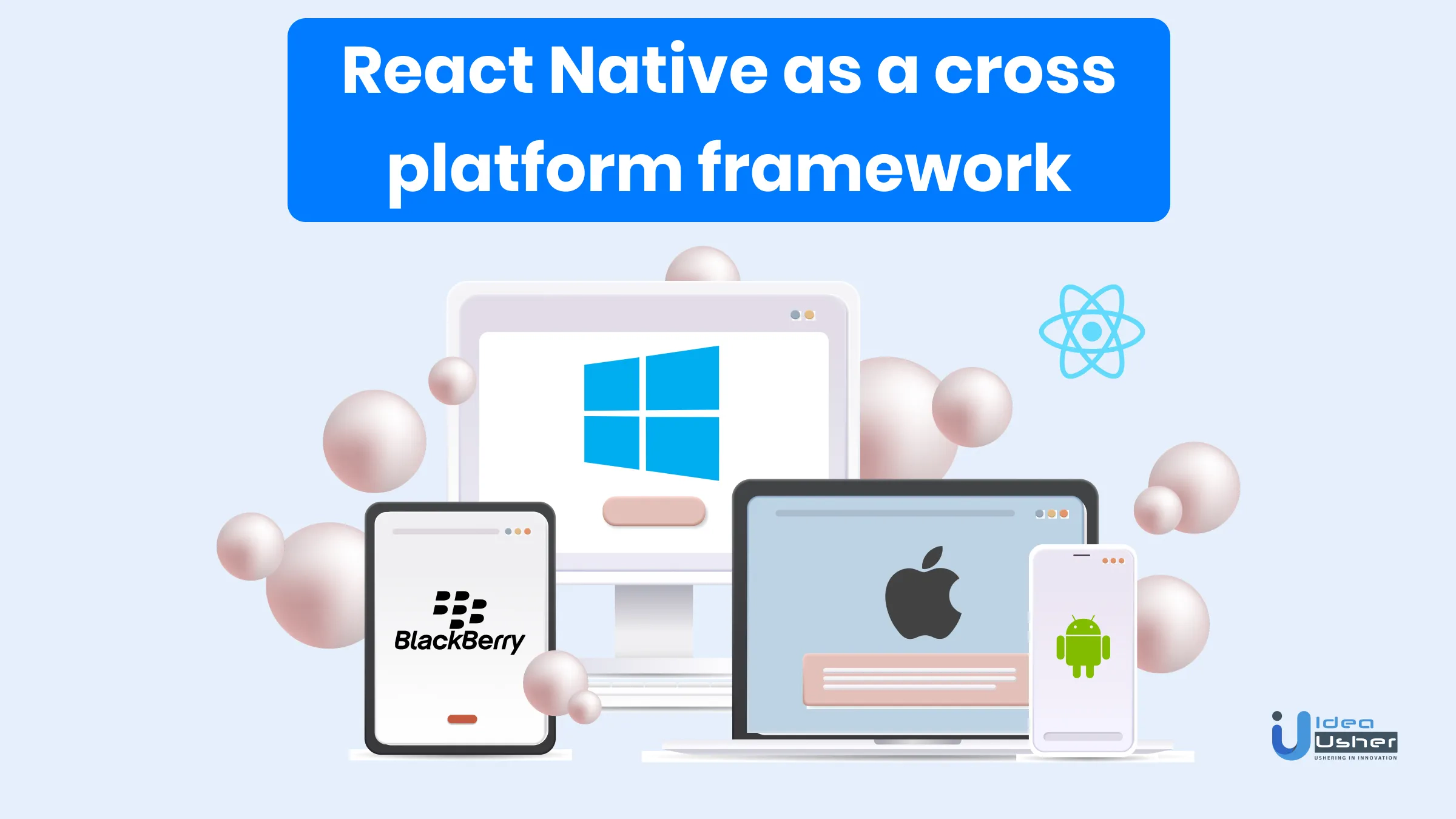
React Native is perhaps one of the most popular Node.js frameworks. It is used to make Android and iOS apps using the same codebase.
Using React Native is one of the best options when it comes to Node.js mobile app development. This is because developers use the same codebase to develop both the iOS and the Android versions, which function smoothly.
It is one of the biggest and most successful projects of all time on GitHub. So, even if you face any problems with the framework, it can be easily resolved.
Popular apps like Uber Eats, Discord, and even Airbnb use React Native to develop and maintain their mobile applications.
5. Express.js
Express.js definitely makes it to this list as one of the most preferred Node.js frameworks. Express launched in 2010 and has a simple and minimalistic approach to Node.js development.
It is easier to learn compared to other frameworks. And just the basic knowledge of how Node.js functions will be enough to accelerate your familiarity with this framework. Express is useful in all cases of web or mobile app development on a small or large scale.
Express improves the client-server interaction speed and thus improves the user experience significantly. It also offers many features that take the back-end development to the next level.
There are many popular apps that use the express.js framework, such as Netflix, PayPal, Yahoo, and Mozilla all use Express.js.
6. Flutter
Flutter is used to make 2-dimensional mobile apps for both iOS and Android. It is primarily used to give the user a more immersive experience of the app.
Flutter markets itself as:
“Flutter is an open-source framework by Google for building beautiful, natively compiled, multi-platform applications from a single codebase.”
This particular framework is also backed and used by Google. Many brands around the world use Flutter as their framework of choice. It is also maintained by a community of global developers. Flutter is the framework of choice if you want to create wonderful UI apps.
7. Mobile Angular UI
It is used for developing Node.js hybrid apps. It is an open-source framework that is used for making and dividing the portions on your mobile screen.
AngularJS is a front-end framework that is rapidly gaining in popularity. Its features and flexibility receive praise from the community of developers working with it. This makes it the perfect solution to the challenges of building mobile applications.
The AngularUI team took this opportunity to develop a framework that would help developers create great mobile applications.
8. Next.js
Next.js serves as a React framework for constructing full-stack web applications. It goes beyond React by offering additional features and optimizations, streamlining the configuration of necessary tooling for React development. Notable features encompass routing, both client-side and server-side rendering, data fetching, and support for various styling methods.
Effectively using Next.js involves understanding project requirements, selecting the most fitting framework, grasping the basics of Node.js and JavaScript, adhering to best practices, and leveraging the diverse ecosystem of libraries and tools.
9. Koa.js
Koa.js, conceived by the Express team, stands out as a lightweight and modular web framework. It enhances error handling through the utilization of async functions. Noteworthy for not incorporating middleware within its core, Koa.js provides an elegant suite of methods for server development.
Successful implementation of Koa.js entails understanding project needs, mastering JavaScript and ES6 syntax, and adopting the MVC (model view controller) design pattern.
10. Meteor.js
Meteor.js emerges as a comprehensive JavaScript platform catering to the development of modern web and mobile applications. It encompasses essential technologies for constructing connected-client reactive applications, accompanied by a build tool and curated packages from the Node.js and wider JavaScript community.
Maximizing the potential of Meteor.js requires a clear understanding of project requirements, proficiency in JavaScript and ES6 syntax, and adherence to the MVC design pattern. While Meteor.js excels in integration, combining diverse packages may demand additional effort.
Why we should use Node.js for App Development
Using Node.js for app development can offer several advantages. Here are seven detailed reasons:
1. JavaScript Full-Stack Development
Node.js enables full-stack JavaScript development, allowing developers to use the same language (JavaScript) for both the frontend and backend of the application. This consistency streamlines the development process and reduces the need for context switching between different programming languages, making it easier for developers to build and maintain applications.
2. Asynchronous and Non-Blocking I/O
Node.js uses an event-driven, non-blocking I/O model, which allows it to handle multiple concurrent operations efficiently. This is crucial for applications that require real-time data processing or handle a large number of simultaneous connections, such as chat applications, online gaming, or streaming services.
The non-blocking I/O ensures that the server can continue processing other tasks while waiting for I/O operations to complete, leading to better performance and responsiveness.
3. Scalability
Node.js is highly scalable due to its non-blocking architecture and event-driven nature. It can handle a large number of concurrent connections with a minimal memory footprint. This scalability is crucial for applications that need to accommodate sudden spikes in user traffic or demand, allowing businesses to expand their services without major infrastructure changes.
4. Large NPM Ecosystem
Node.js comes with the Node Package Manager (NPM), one of the most extensive package ecosystems for any programming language. NPM provides access to a vast collection of open-source libraries, modules, and tools that can significantly speed up the development process. Developers can easily integrate these packages into their applications, reducing the need to reinvent the wheel and fostering a more efficient development workflow.
5. Real-Time Web Applications
Node.js is well-suited for real-time web applications that require continuous two-way communication between the client and the server. With technologies like WebSockets and Server-Sent Events (SSE), developers can seamlessly implement real-time features like live chat, notifications, and collaborative editing. This capability is crucial for modern applications that aim to provide interactive and dynamic user experiences.
6. Microservices Architecture
Node.js is an excellent choice for building microservices-based architectures. Its lightweight and modular design makes it easy to develop, deploy, and manage individual microservices, each responsible for a specific function within the application. This approach promotes scalability, fault isolation, and independent development of different components, making it easier to maintain and update the app.
7. Community and Support
Node.js has a large and active community of developers, which means you can find plenty of resources, tutorials, and libraries to assist you throughout the development process. This strong community support ensures that Node.js remains up-to-date with the latest trends and security patches, making it a reliable choice for app development.
8. Efficient Data Sharing
Node.js excels in facilitating smooth data exchange between the server-side and client-side components. This proficiency ensures a frictionless exchange of information, enhancing communication across different facets of an application. By facilitating seamless data exchange, Node.js contributes to the creation of responsive and interconnected applications.
This capability is particularly crucial in modern development, where real-time interactions and data synchronization between server and client are paramount for delivering a smooth and dynamic user experience.
9. Versatility in Cross-Platform Capabilities
Functioning as an open-source, server-side, cross-platform JavaScript runtime environment, Node.js empowers developers to create and execute server-side applications across a spectrum of platforms. This underscores its adaptability and versatility, allowing for a more diverse application landscape.
10. Robust Framework Support
Node.js provides a diverse array of frameworks, serving as invaluable tools for developers in crafting optimal mobile applications. These frameworks, working in tandem with the extensive Node Package Manager (NPM) ecosystem, enhance the developer toolkit, ensuring efficiency and flexibility in the development process.
Additionally, businesses worldwide are increasingly turning to Node.js for multiple compelling reasons, solidifying its position as a preferred technology. Here’s an in-depth exploration of –
Why will renowned companies opt for Node.js in 2024?
Based on what we’ve learned in the past year, it’s clear that Node.js is a great pick for companies in 2024.
1. Revolutionizing Startup Performance
- PayPal and Netflix achieved a dramatic reduction in startup time, plummeting from over 40 minutes to less than a minute.
- Post-migration, PayPal recorded a remarkable 35% decrease in average response time, instilling greater customer trust and satisfaction.
2. Efficiency and Impact on Businesses
- Node.js emerges as a pivotal force in amplifying operational efficiency, with a mere 4% of businesses claiming no influence.
- Collaborating with a Node.js web development company promises to unlock optimal benefits and advancements, propelling businesses forward.
3. Cost-Efficiency and Scalability
- The adoption of Node.js translates into a substantial 50%-60% reduction in loading times, showcasing unparalleled speed and responsiveness.
- Businesses can strategically reduce the number of servers required, leading to substantial cost savings and streamlined scalability.
4. Node.js: Synonymous with Excellence
- The Node.js landscape is characterized by simplicity, speed, power, scalability, and flexibility.
- This unique combination positions Node.js as an ideal technology investment for businesses seeking reliability in 2024.
5. Strategic Cost Reductions
- Node.js emerges as a cost-saving champion, delivering a significant 58% reduction in development costs.
- Organizations report sustained cost efficiencies, with a notable 12% reduction in development expenses after two years of Node.js adoption.
6. Optimized Application Performance
- Node.js showcases a robust 50% improvement in application performance, powered by its formidable V8 JavaScript engine.
- Integration of Node.js results in a commendable 68% increase in developer productivity, signaling a strategic advantage for businesses.
7. Community Support and Global Adoption
- A thriving community surrounds Node.js, with 42.73% of professional developers actively leveraging its libraries, frameworks, and IDEs for app development.
- Node.js’s inherent simplicity attracts developers, ensuring constant support and regular updates for a seamless and dynamic development experience.
8. Versatility Across Industries
- Node.js proves its versatility across diverse industries, showcasing its prowess in delivering unmatched speed and efficiency.
- The technology finds widespread adoption among high-traffic websites, reinforcing its reputation for superior performance.
20 Key Features of Node.js for Optimal App Development
1. Asynchronous I/O
Node.js is built on an event-driven, non-blocking I/O model. This means that it can handle multiple I/O operations concurrently without waiting for each operation to complete, making it highly efficient and scalable for handling a large number of concurrent connections.
2. Single-Threaded Event Loop
Node.js operates on a single-threaded event loop, allowing it to manage asynchronous operations efficiently and avoid the overhead of creating and managing multiple threads. It uses callback functions to handle events and maintain a responsive and performant application.
3. NPM (Node Package Manager)
Node.js comes with NPM, one of the largest package ecosystems in the world. NPM allows developers to easily install, manage, and share reusable code packages, libraries, and modules, making development faster and more efficient.
4. Cross-Platform Compatibility
Node.js is designed to be cross-platform, which means it can run on various operating systems, including Windows, macOS, and Linux. This makes it easier for developers to write code once and deploy it on different platforms without modification.
5. Scalability
Node.js’s event-driven, non-blocking architecture makes it highly scalable. It can handle a large number of concurrent connections and is suitable for building applications that require high scalability, such as real-time applications and microservices architectures.
6. Built-in HTTP Module
Node.js provides a built-in HTTP module that allows developers to create web servers and handle HTTP requests and responses. This built-in module simplifies the process of building web applications and APIs.
7. Real-Time Applications
Node.js is well-suited for real-time applications that require continuous two-way communication between the client and the server. It enables the implementation of real-time features like WebSockets and Server-Sent Events (SSE) for building interactive and dynamic applications.
8. Open Source
Node.js is an open-source platform, which means its source code is freely available for developers to view, modify, and distribute. This fosters a strong community of contributors and users who continuously improve and support the platform.
9. Lightweight and Fast
Node.js is lightweight and fast due to its event-driven, non-blocking design. It has a minimal runtime overhead and starts up quickly, making it suitable for various applications where speed and efficiency are crucial.
10. Modular Design
Node.js promotes modular design, allowing developers to break down applications into smaller, reusable modules. This enhances code maintainability and facilitates collaborative development.
11. Rich Ecosystem of Modules
In addition to the core modules, Node.js boasts a vast ecosystem of external modules available through NPM. Developers can tap into this rich resource to extend functionalities and accelerate development.
12. Event Emitters
Node.js utilizes event emitters to facilitate communication between objects. This pattern enhances code organization and supports the creation of custom events, contributing to a more flexible application structure.
13. Streaming Data Processing
Node.js excels in streaming data processing, enabling the efficient handling of large datasets. This is particularly advantageous for applications dealing with real-time analytics or media streaming.
14. Middleware Integration
Node.js seamlessly integrates with middleware components, facilitating the creation of robust web applications. Middleware functions can be easily added to the HTTP processing pipeline, enhancing flexibility and extensibility.
15. Package Version Management
NPM provides robust version management for packages, ensuring consistent and reproducible builds. Developers can specify package versions in the project’s package.json file, promoting stability across different environments.
16. Community Support and Vibrant Ecosystem
Node.js benefits from an active and vibrant community. The community support extends beyond code contributions to encompass forums, tutorials, and resources, fostering a collaborative environment for knowledge sharing.
17. Debugger Support
Node.js includes built-in debugging capabilities, allowing developers to inspect and troubleshoot applications more efficiently. This feature is valuable for identifying and resolving issues during the development process.
18. Security Features
Node.js incorporates security features, such as the ability to limit access to certain modules or resources. This ensures that applications built on Node.js can adhere to security best practices.
19. Cross-Functional Development
Node.js supports not only server-side development but also facilitates the creation of cross-functional applications, including desktop applications and command-line tools, contributing to its versatility.
20. Cluster Module for Scalability
Node.js provides a built-in Cluster module that enables developers to create child processes, each running on its own core. This allows for parallel execution of tasks, enhancing performance, and taking full advantage of multi-core systems. With the Cluster module, Node.js applications can efficiently distribute the workload across multiple cores, leading to improved scalability and responsiveness. This feature is particularly valuable for applications that need to handle a significant volume of concurrent connections and leverage the full power of modern hardware architectures.
Top 10 Companies using Node.js
A lot of popular applications are being built using Node.js. In this article, we would like to share some of the most popular Node.js mobile apps. This will give you an idea about the type of applications that can be built using Node.js.
1. PayPal
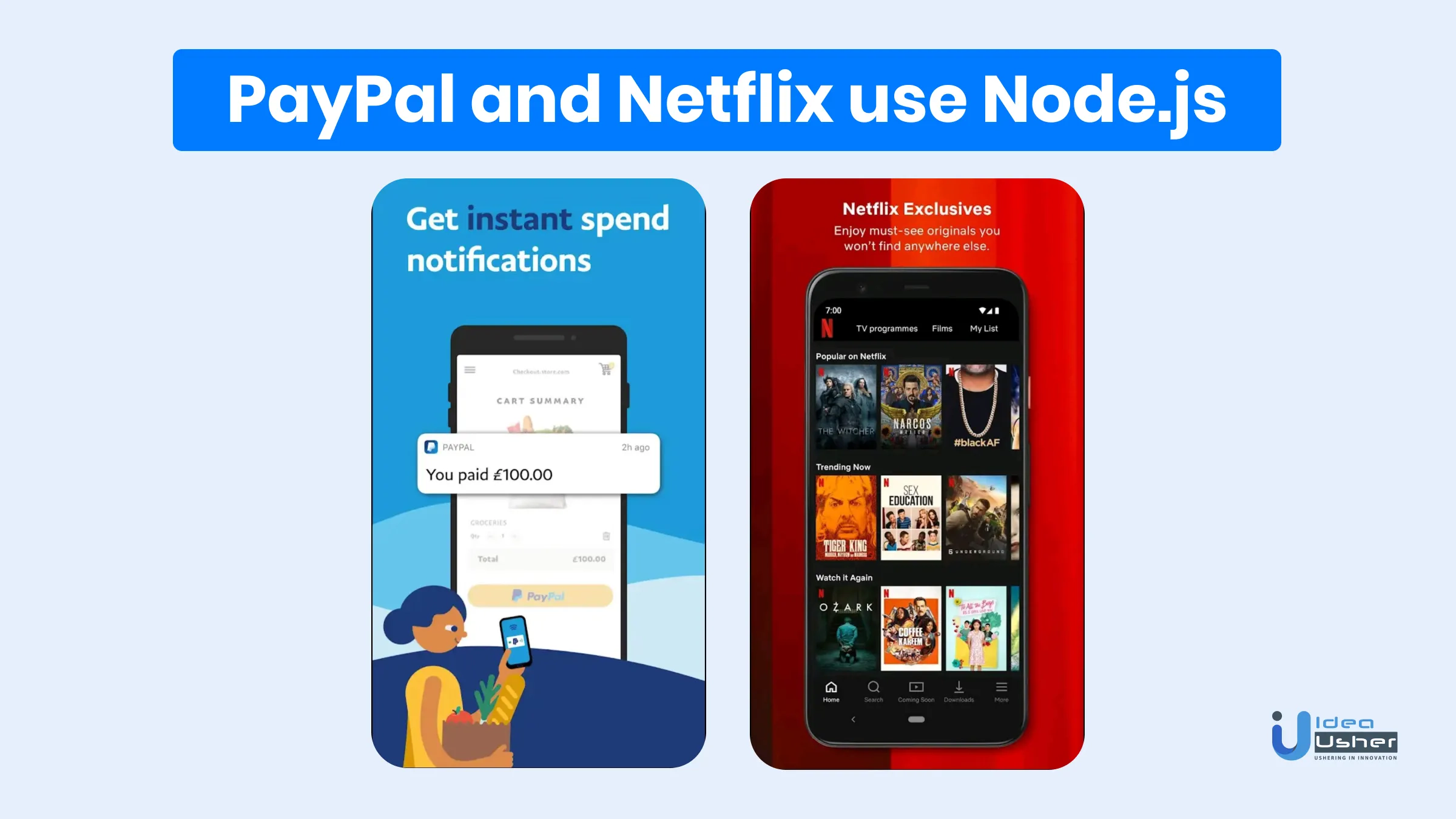
The reasons for PayPal’s choice of technology were simple. It had to ensure alpha performance, support millions of transactions every second, and should be future-ready. To meet these demands, PayPal turned to Node.js.
PayPal is the biggest name in online payment and they have recently released an open-source library that uses Node.js.
PayPal is famous for its cutting-edge technology. It was the first to introduce person-to-person payments via email. They were the first to allow people to send money with friends on Facebook, and they were the first to let you pay from your messaging app. So perhaps it’s no surprise that it’s now the first to use Node.js.
2. Netflix
The Netflix Cloud uses Node.js on the backend. It is a JavaScript-based server-side engine that allows it to scale easily to accommodate its massive growth.
It is a much better choice for high-performance, real-time apps, and is being used for everything from building websites and mobile apps. Node.js is used to power e-commerce platforms and SaaS products.
Netflix is currently using Node.js to handle the volume of requests that it gets on a daily basis. This makes Node.js, one of the most popular frameworks for building scalable network applications.
It was a little over a year ago when Netflix decided to use Node.js for its web services. And now, it has become one of the most important components in the company’s quest for scalability.
3. Uber

Uber is a mobile application that is used/meant for car tracking, car booking, and taxi booking. It uses Node.js mobile app development as a core framework for its mobile and web application development. Uber is using Node.JS as a middleware technology to connect the frontend web with backend services and databases.
They are famous for being one of the latest big-name companies to use Node.js on their product. They are a hugely successful company and are now worth over $50 billion.
4. eBay
The twenty-six-year-old auction site uses Node.js to build its mobile apps. Their mobile app is among the most popular in the world, generating significant revenues for the company.
Why? Node.js is open source and is a pragmatic programming environment that allows developers to write code quickly. While doing the same it does not sacrifice reliability or expressiveness. eBay is now using Node.js to develop its next-generation payment platform. This proves that Javascript is a great language to use for e-commerce.
It is great to read about the innovative companies that use Node for backend processes. eBay is one of them. Mark Mehdizadeh at eBay shared his experience with Node.js. Here is a quote from him:–
The next app on my list was creating a listing tool that could create and publish new listings in real-time. This app also had to support multiple marketplaces, so we decided on a Node.js Express stack with MongoDB. Share on X5. LinkedIn
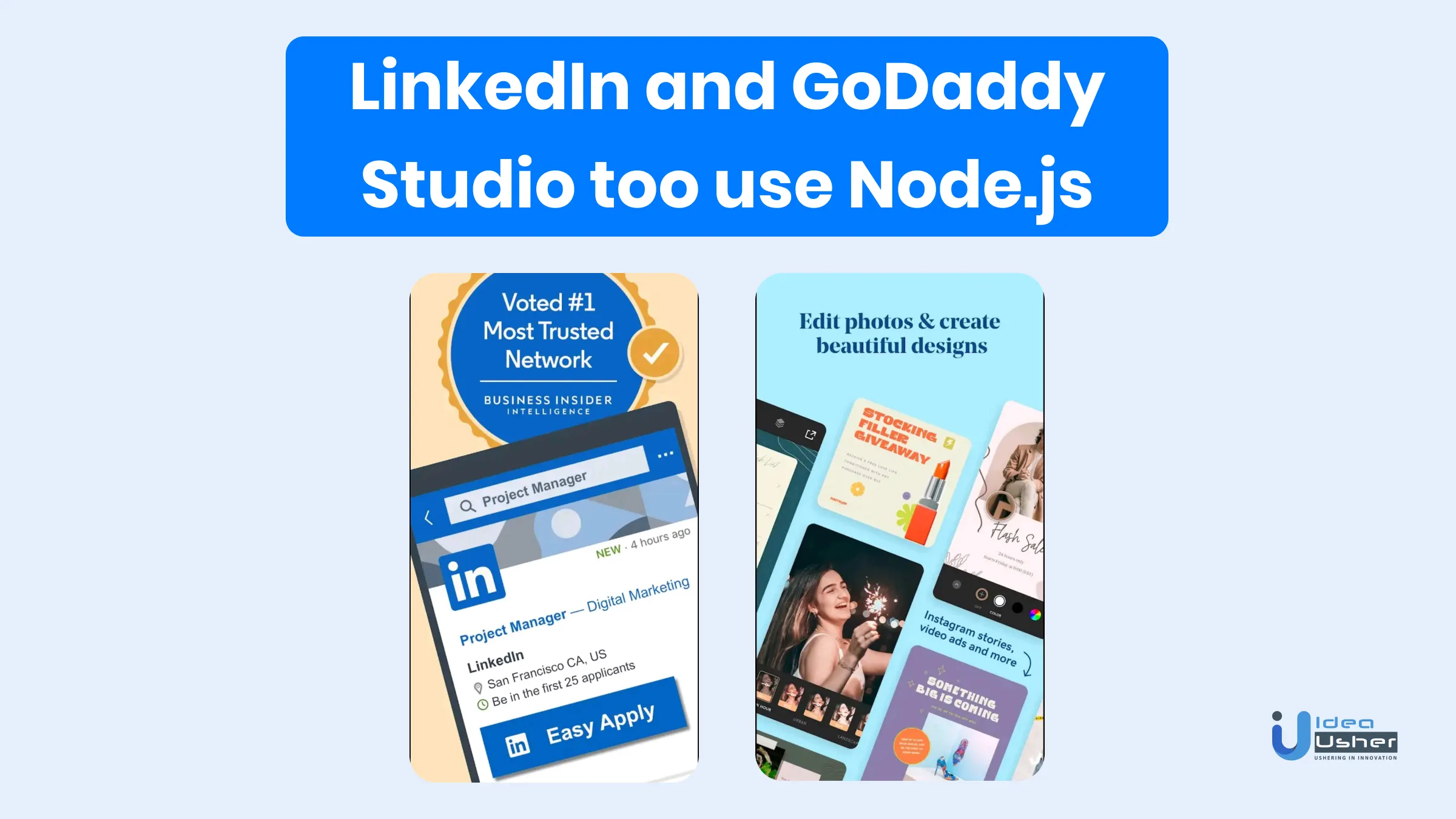
LinkedIn has announced (2011) that it is adopting the use of Node.js for the development of its web applications. This was a big deal for the Node.js community as a whole and is one of the first major high-profile companies to make such an announcement.
LinkedIn has been around for quite a while and today it is the most popular professional social network. It uses Node.js based on their experience of using it in their mobile apps. They found that using Node.js app servers instead of a normal web server improves their performance in production significantly.
6. GoDaddy
The website builder and web hosting provider have announced that it has started to use Node.js on its backend. And, the decision was taken in order to manage internal tools, services, API, and public website features.
Node is a server-side runtime environment that is designed with Javascript. It is able to communicate with the frontend (aka the user). It is a lightweight platform that is easy to spin up, deploy and develop apps with.
GoDaddy has also added Node.js to the list of supported languages for their Go Central service. GoCentral is a platform for developers to help them easily deploy, manage and host their applications on the cloud.
GoDaddy also offers support for PHP, Perl, and Python when it comes to application deployment on their GoCentral platform.
How much time does Node.js mobile app development take?
Well, this is a loaded question. It all depends on what you are going to develop. Node.js comes with a set of tools that makes it easy for developers to create the application. When you choose a framework than the time consumption changes.
If you are using any Node.js template, then the app development timeline will get stretched if you are choosing the non-template option. But, on average, it takes around 3 months to develop an app using Node.js.
One of the key factors in deciding which technology to use is the cost associated with it. This is especially important if we are talking about a startup or any other small business. Here, you need to make sure that your investment is worthwhile and that you get the most out of your marketing budget.
The timeframe for Node.js mobile app development depends on various factors:
1. App Complexity
The intricacy of your mobile app greatly affects how long it takes to build. If your app has lots of fancy features and does complex things, it’ll naturally take more time to develop. Think about things like how users interact with your app, the special features it has, and any complicated behind-the-scenes work it needs to do. The more complex your app, the more time it takes to bring it to life.
2. Development Team’s Expertise
The skill and experience of the people building your app make a big difference in how quickly it gets done. If you’ve got a team that really knows their way around Node.js and JavaScript, they can work through challenges faster. Experience with similar projects helps them predict and handle problems well. Having a skilled team not only speeds things up but also means they’ll build your app right, following best practices and making it a success.
3. Framework and Library Utilization
Using tools made for Node.js, like Express.js or Socket.IO, can make the development process much quicker. These tools provide ready-made functions, so there’s less need to start from scratch. This not only speeds things up but also ensures that the code stays high-quality. Making smart use of these tools streamlines the development process.
4. Integration with External Services
When your app needs to connect with outside services, like other apps or databases, it can take more time to build. Making sure your app talks to these external services smoothly needs careful planning. The complexity of this task, combined with the need for strong security measures, can stretch out the development time. Managing these aspects well is key to making sure your project stays on track.
5. Testing and Debugging
Testing and fixing problems are big parts of making a reliable app. Testing makes sure everything works as it should, and fixing problems ensures a smooth user experience. Although this phase might add some time to the overall process, it’s crucial for delivering an app that works well. Taking the time to test properly improves your app’s performance, security, and how much users will enjoy using it.
Providing a precise time frame is challenging without detailed project specifications. For a more accurate estimation, consulting with a development team or a professional to evaluate specific project requirements is recommended.
Key consideration for developing a mobile app using Node.js
When developing a mobile app with Node.js, it’s important to thoughtfully consider several key factors to ensure the success of your project:
1. Comprehensive Node.js and JavaScript Understanding
Before delving into the development process, it’s imperative to possess a robust grasp of Node.js and JavaScript, laying the foundation for efficient and effective coding.
2. Optimal Framework Selection
Given the diverse range of frameworks within Node.js, selecting the one that aligns seamlessly with your project’s requirements is pivotal for streamlined development.
3. Scalability Implementation
Leverage Node.js’s inherent scalability features during the app’s design phase to accommodate potential growth and increased user demand.
4. Efficient Data Handling
Exploit Node.js’s capability for seamless data sharing between server-side and client-side components, facilitating efficient communication.
5. Integration of APIs for Enhanced Performance
Outsourcing certain functionalities to APIs can significantly enhance the app’s overall performance, contributing to a smoother user experience.
6. Security Best Practices
Safeguard sensitive information by avoiding the inclusion of secret keys within the app. Instead, store them securely on a server and create endpoints for client API calls, ensuring robust security measures.
7. Mobile Backend as a Service (MBaaS) Consideration
Evaluate the benefits of employing MBaaS providers to expedite the development and reduce the complexities associated with maintaining the architecture.
8. Thorough Testing Protocols
Regular and comprehensive testing is paramount to identifying and rectifying potential bugs at an early stage, ensuring a robust and reliable mobile app.
Understanding that the best practices can differ depending on your project’s specific requirements is crucial. By following these considerations, you set the foundation for a successful development journey for your Node.js-based mobile app.
Conclusion
Overall the Node.js framework has made significant improvements over the years in the accessibility of mobile application development. Many companies and developers are using Node.js.
The framework and its use have helped companies immensely. It has facilitated the development of high-performance applications with greater flexibility and less time to market.
It also provides a robust debugging platform that can be used to develop scalable applications for different platforms and devices.
Idea Usher has access to the tools and the skills that you require in order to create a beautiful application using Node.js. The team has access to all the necessary tools and resources required by your Node.js mobile app development project.
With a reasonable budget, you can develop the best Node.js mobile application with us. You can contact us if you want to build a Node.js mobile app that will dominate the market in 2022.
FAQs
Q. Is Node.js Scalable?
A. Node.js is extremely scalable due to its load balancing.
Q. Can we use Node.js for large applications?
A. Node.js uses JavaScript which runs on event loops, it is not that efficient when implemented in bulk. But, it is still an extremely capable option when creating large applications. For example Netflix, Uber, etc.
Q. Is Node.js simpler to learn than Java?
A. Yes, Node.js is far simpler to learn than Java and has a less steep learning curve.












Ronit Banerjee